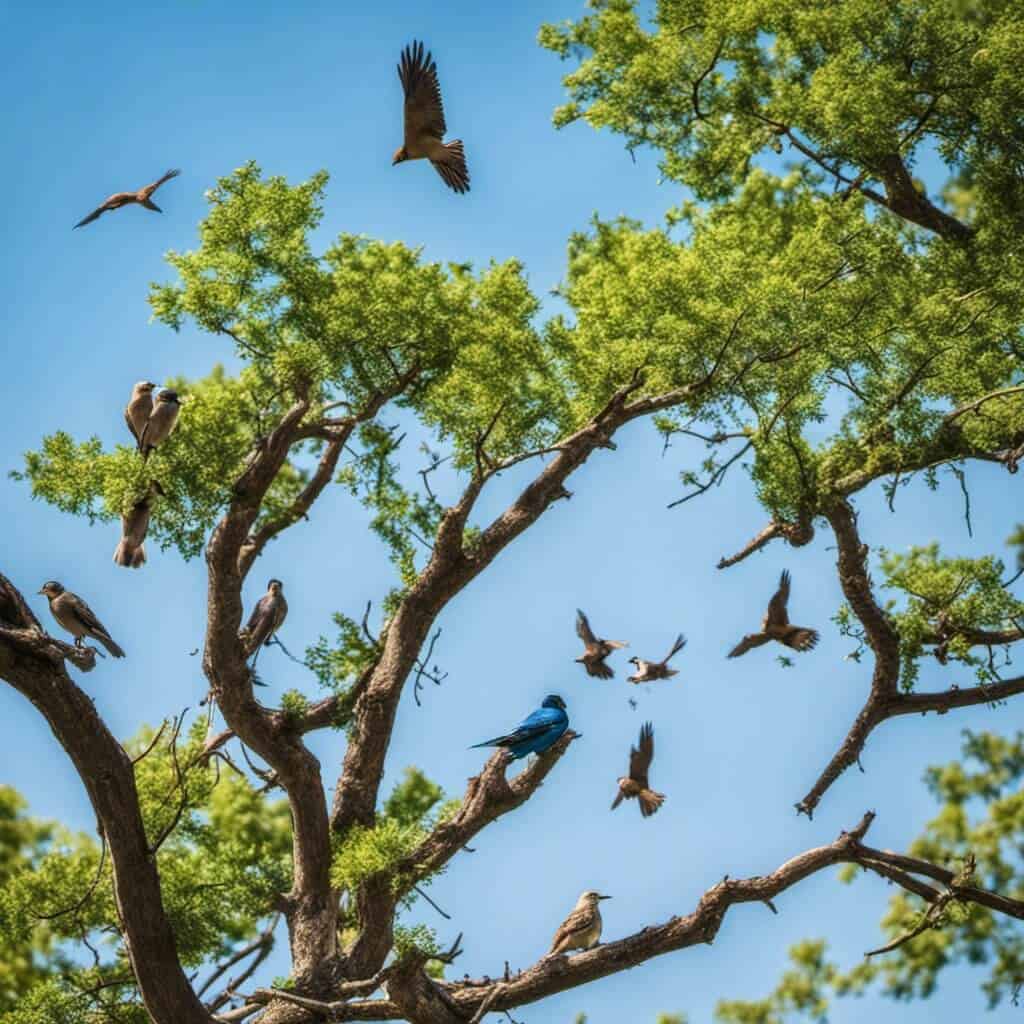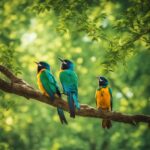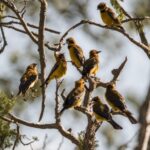While bird watching can be a rewarding and enjoyable leisure hobby, it’s important to remember that birds are living creatures, which means taking steps to minimize any disturbance to birds and their habitats, and there are many ethical considerations in pursuing this hobby.
Ethics Of Bird Watching Components
You can better appreciate these fantastic creatures and contribute to conservation efforts as a birder. As a birder, respecting the birds and their habitats is essential to minimizing bird disturbance and avoiding damage to their nests or other natural features. Local regulations and guidelines for bird watching include staying on designated trails.
Avoiding and disturbing nesting birds is especially important during breeding season, when birds may be especially vulnerable. It’s also important to avoid disturbing birds during their feeding times, as this can interfere with their ability to find food and cause unnecessary stress.
Another important consideration is avoiding damaging or disturbing bird habitats, including trampling through wetlands or marshes and disturbing nesting sites or bird roosts. Being an ethical bird watcher means being a good role model for others. Following ethical guidelines can help ensure others respect and appreciate birds and their habitats.
Integrity is also essential to ethical bird watching, meaning being honest about your sightings and not exaggerating or falsifying your observations. It is also crucial to report any illegal or unethical behaviour you witness.
Ethics Of Bird Watching – Understanding Bird Behavior
A basic understanding of bird behaviour is important for ethical bird watching, as it minimizes disturbance to birds and their habitats.
Different bird species have different behaviours. For example, some birds are more social than others. Some birds are more active during the day, while others are more active at night. Knowing the behaviour of the species you are observing can help you to predict their movements and avoid disturbing them.
Various factors, weather, time of day, and season can influence bird behaviour. For example, birds may be more active during the early morning or late afternoon when the weather is cooler. Understanding these patterns can help you to plan your bird watching activities and avoid disturbing the birds.
- Birds communicate with each other through vocalizations. Different types of vocalizations can have different meanings. For example, a bird may call to warn other birds of danger or attract a mate. Learning to recognize different vocalizations can help you better understand bird behaviour.
- Birds use flight for various purposes, including hunting, migration, and escape. Understanding how birds fly can help you to predict their movements and avoid disturbing them. For example, some birds may fly low to the ground when hunting, while others may fly high in the sky during migration.
- Birds that are raising young may be more sensitive to disturbance. It is vital to avoid getting too close to nesting birds or disturbing them. If you see a bird that appears agitated or distressed, it may be defending its nest or young. Give these birds plenty of space and observe them from a distance.
Birding Community and Regulations
Birding groups are a great way to connect with other birdwatchers and learn about ethical birding practices. The American Birding Association (ABA) is a well-known organization that promotes responsible birding and conservation efforts. The ABA has a code of ethics that all members must follow, including respecting bird habitats and avoiding disturbing nesting birds.
Following ethical guidelines will help minimize disturbance to birds and their habitats and ensure that bird watching remains a sustainable and enjoyable leisure activity for everyone.
The American Birding Association (ABA) has established a Code of Birding Ethics that provides guidelines for ethical bird watching. Some of the key ethical rules include:
- Respect the law and the rights of others.
- Minimize disturbance to birds and their habitats.
- Do not use playback or other recordings to attract birds.
- Do not approach nests or nesting birds.
- Do not touch or handle birds or their eggs.
Awareness of birding laws and regulations in your country, state or region is essential. Harming or disturbing migratory birds and their habitats without a permit is against the law in North America. Additionally, there are bird watching and wildlife conservation laws in many states.
Tips For Minimizing Disturbance to Birds
As a responsible bird watcher, minimize disturbance to birds and their habitats.
Approaching Birds
Approaching birds can be delicate, as birds can be easily spooked by human presence. Keep a safe distance from the birds and approach them slowly and quietly. If the birds show signs of stress, such as vocalizing or flying away, it is best to back off and give them space.
Use of Audio Methods
Audio methods, such as playback of bird calls, can attract birds for observation when used responsibly. Avoid playing calls at high volumes or for extended periods, as this can cause stress and disrupt natural behaviour. Additionally, be aware of the potential for attracting birds away from their nests or exposing them to danger.
Photographing Birds
Photographing birds can be a rewarding experience but do so without causing disturbance. When using a telephoto lens, maintain a safe distance from the birds and avoid using the flash, which can startle and stress them.
Respecting Private and Public Property
When bird watching, it is essential to respect private and public property. Always obtain permission before entering private property and follow all rules and regulations when bird watching on public land, including staying on designated trails and not disturbing vegetation or wildlife.
Promoting Native Vegetation
Bird habitats are often dependent on native vegetation. When landscaping, consider using native plants that provide bird food and shelter. You can include planting trees, shrubs, and flowers indigenous to your area. By promoting native vegetation, you can help create and maintain healthy bird habitats.
Climate Change and Bird Habitats
Climate change does impact bird habitats. As temperatures rise, bird habitats can shift, causing changes in migration patterns and food sources. To help mitigate the effects of climate change on bird habitats, consider supporting sustainable agricultural practices.
Respect Wildlife – Remember that birds are not the only animals that live in the area. Avoid disturbing other wildlife, such as mammals or reptiles, while bird watching.
Respect Predators – Birds have natural predators, and it is important to avoid disturbing them as well. If you see a predator, such as a hawk or owl, do not approach it. Instead, observe from a respectful distance.
Bird Refuges – Some areas may be designated as bird refuges or sanctuaries. These areas are significant for bird conservation and should always be respected. Follow any rules or guidelines posted in the area.
Use Binoculars Or A Scope – Binoculars are a great way to observe birds from a respectful distance. They allow you to look closer without disturbing the bird or its habitat.
Remember that bird watching aims to observe and appreciate birds, not disrupt their lives.
Safe Feeding Stations
Feeding birds can be a great way to attract them to your yard but do it safely. Here are some guidelines for setting up a safe feeding station:
- Use feeders that are easy to clean and disinfect.
- Keep feeders at least 10 feet away from windows to prevent window strikes.
- Clean feeders regularly to prevent disease.
- Use birdseed that is appropriate for the types of birds in your area.
- Avoid feeding birds foods that are unhealthy for them, such as bread, crackers, or junk food.
Prevent Window Strikes
Birds often collide with windows, which can result in injury or death. Here are some ways to prevent window strikes:
- Install decals, stickers, or other visual cues on windows to make them more visible to birds.
- Move bird feeders and birdbaths away from windows.
- Close curtains or blinds when windows are not in use.
- Install screens or netting over windows to create a barrier.
Managing Pets
Cats and dogs can threaten birds, so manage them appropriately. Here are some guidelines for managing pets:
- Keep cats indoors or provide them with an outdoor enclosure.
- Keep dogs on a leash or in a fenced area when outside.
- Train dogs not to chase or harass birds.
- Avoid walking dogs in sensitive bird habitats.
Ethics Of Bird Watching – Advocacy for Bird Conservation
As a responsible birdwatcher, you can advocate for bird conservation, which means taking action to protect birds and their habitats. You can get involved by staying informed about the latest research on bird populations, habitat loss, and other conservation issues. Support conservation programs that work to protect birds and their habitats by donating to conservation organizations, volunteering for bird monitoring programs, or participating in citizen science projects.
Build connections with other bird watchers, conservationists, and policymakers, and by working together, you can make a more significant impact and create positive change for birds.
Share your knowledge and resources with others, including birding hotspots, tips for minimizing disturbance to birds, or information about conservation initiatives. Speak up for birds and their habitats by advocating for conservation policies, contacting your elected officials, supporting conservation initiatives, or participating in public comment periods. When reporting your bird sightings, be honest and accurate, as this information is used to track bird populations and inform conservation efforts.
Final Thoughts
Bird watching is a rewarding and fulfilling leisure hobby where the ethics of bird watching must be kept in mind. The well being of the birds needs always to come first, and with responsible bird watching practices, we can continue to appreciate these beautiful creatures for generations to come.
Frequently Asked Questions
What is the importance of using bird blinds when observing birds?
Bird blinds are a great way to observe birds without disturbing them. They provide a hidden location for bird watchers to observe birds from a safe distance, which helps reduce the birds’ stress and allows them to go about their normal activities without feeling threatened.
What are the benefits of bird watching for the environment?
Bird watching can have many benefits for the environment. It can raise awareness about protecting bird habitats and preserving biodiversity. It can also provide valuable data for scientific research, such as tracking bird populations and migration patterns.
What is the eBird Code of Ethics, and why is it important for bird watchers to follow it?
The eBird Code of Ethics is a set of guidelines for bird watchers to follow when observing birds. It includes principles such as respecting the birds and their habitats, avoiding disturbance, and sharing data responsibly. Following the eBird Code of Ethics is essential because it helps ensure that bird watching is done responsibly and sustainably, benefiting both the birds and the environment.






